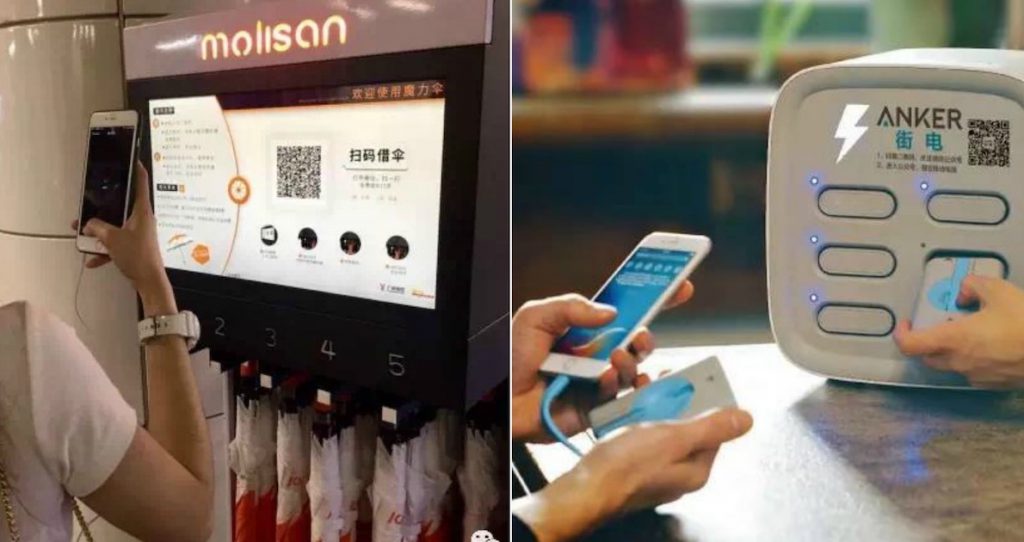My colleague recently showed me an article that talked about how you can actually rent a man in Japan for just $9 an hour.
Sounds baffling – though I reckon that there is an actual market for that.
There are so many reasons I can think of why a female would need to engage this service, be it for pure companionship, or to bring them home during Chinese New Year so your pesky relatives can finally shut up and stop asking, “Why are you still single? No boyfriend ah?”.
This novel business idea got me thinking: What are some other viable sharing economy ideas that would actually work in Singapore?
I went around the office and asked 10 millennials to share their thoughts, here’s what they have to say:
Melissa Chan, 27

Idea: Powerbank sharing
“Singaporeans are always on their mobile phones and it just sucks when it runs out of battery. My iPhone’s battery is especially like shit! The battery level tends to drop rapidly without warning.
Like, I was out yesterday at Orchard when my iPhone died on me again. I didn’t have any mobile charging devices on me so I was tempted to just buy a new powerbank, but it’s not exactly cheap.
I know some malls and MRT stations have charging points, but I just don’t have the time to wait for it to charge. So a powerbank sharing system would be good – I can just rent one cheaply for a one-time use and charge my phone while on the go. It would be very convenient and I think it will be a hit among Singaporeans!
I just hope Singaporeans won’t misuse it like how they abuse the shared bikes. Those bicycles are equipped with trackers yet people can still steal them, sigh.”
Victoria Sek, 25

Idea: Umbrella sharing
“Umbrella sharing will be especially useful for people who take our sunny weather for granted.
One time, I left home without my umbrella and walked to the MRT station with the sun shining brightly. But when I got to the MRT station nearest to my workplace, it started pouring so heavily. I knew I would be completely drenched if I walked to my workplace without an umbrella, but since I was running late for work, I ended up having to ask this petite-sized aunty if I could walk with her. She only had a tiny umbrella, so in the end both of us had one side of our arms and legs wet while struggling to fit under her brolly.
If Singapore brings in umbrella sharing, it would be great if it can be placed at convenient places where people can easily find and return them, or at places where there are no shelters to the nearest mall, bus stops, MRT stations, etc.
Ultimately, I think umbrella-sharing is a fantastic idea for urban dwellers, especially in our tropical climate. Besides the possibility of the umbrellas getting stolen, there is also the issue of them being damaged and then thrown away by irresponsible users who are not informed of the system.
With the number of service-sharing services nowadays, I think this would be a fairly feasible idea put into motion, but the developers would have to come up with ways to keep up with demands and minimise their losses.”
Shaanan Wong, 21

Idea: Textbooks and notes sharing
“School textbooks can be very expensive, and as a broke student myself, I feel the pain of forking out $50 to $100 to purchase a new one. So why not have a textbook sharing system where course seniors or fellow course mates can share their textbooks for a small fee?
Similarly, in polytechnic, not everyone takes the same module at the same time. So when say, Group 1 is done with module A and Group 2 is done with module B, they can exchange their notes to supplement their learning.
Maybe an app would be good to implement this sharing system, where students are allowed to either have a drop-off point for their notes, or allow them to take pictures of their notes and simply upload them on the mobile platform.
It’s quite feasible as most polytechnics have their own apps so this feature can be easily integrated. But maybe with the advent of this system, book and printing shops on campus might be obsolete.”
Lim Bei Ling, 26

Idea: Laptop sharing
“Sometimes when you’re out and about, you will receive a sudden notice to get some work done, but what if you don’t have your laptop with you? Of course, there’s the option of working on your phone but the small screen size is a huge limitation.
Also, if your laptop or computer decide to die on you, or if we forget or lose our laptop and/or chargers, this laptop sharing service will be a lifesaver.
In terms of implementation, it’d be cool if there’s a locker that stores these shared laptops. Just scan a QR code and then the locker will pop open, and you can pay for usage based on the hour, or every 30 minutes. To return, users can simply store the laptop back in the locker.
I think the pick-up rate for this service will be very high because everyone uses laptops (or computers) today. But as always, the problem lies in whether the provider can maintain the laptops because it’s hard to track abuse, both hardware and software.”
Samantha Tay, 25

Idea: Food sharing
“What I hope to see as part of the sharing economy would be food sharing!
For example, say I’d like to have a plate of char kway teow – but I can’t finish the entire plate because, dieting! It’d be great if I can ‘share’ that plate with someone, and maybe meet a new face (wink). We can get a common plate along with smaller sharing plates.
Alternatively, I think I’d like to share my food by buying them ‘suspended’ (i.e. buying them in advance for people who can’t afford it). A Singaporean ran a similar campaign before, but that was a temporary solution.
We tend to carelessly waste copious amounts of food, without thinking about how this looks to poorer people, and how they feel seeing all that food going to waste. It would be a great move if cafes, restaurants, and maybe even hawker centres allow customers to portion out their food right from the start.
It doesn’t have to be much, but if you accumulate portions for 2 to 3 customers, it might make up a full-sized portion for someone who can’t afford to pay!”
Yeo Khee, 24

Idea: Sports equipment sharing
“There are many instances when my friends and I wish to play sports, but we just lack the equipments. For example, we want to play badminton but we don’t have the net. Or we want to play beach volleyball, but we don’t have the ball.
So I think it’d be cool if there’s an app that can connect you to others who have these sport equipments. The target should be based on the vicinity – either near my location, or near the activity venue. The person can just drop the item off at a common locker area. Payment and return can be done via this locker as well.
A secondary agenda behind this service is to also promote and encourage healthy living through sports, so I think the Government will be very open to this idea!”
Loong Mei Yan, 25

Idea: Wedding dress sharing
“I’m a bride-to-be myself and based on my personal wedding dress hunting experience, wedding dresses are very expensive! Starting price is around $1,000 or $2,000. To fork out that much money for a one-day affair is honestly a waste of money to me and I would much rather spend that money on other stuff like my honeymoon trip or my future home.
That said, I think it’d be good if there’s a service that allows people to share their wedding dresses that are just sitting around in their closets. It’s also not uncommon for women to buy their wedding dresses only to regret it, so it’ll be good if there was a way to put it to better use and make some money out of it!
A Carousell-like app for wedding dresses that lets you list your dress, size, price et cetera would be a good way to implement this. If it’s a convenient enough way, I’m sure people will flock to the app and the gains will be substantial.”
Daniel Lim, 25

Idea: Luxury goods sharing
“I’m broadly using the term luxury goods but what I mean by it is apparels, accessories and footwear that are of a high price point. I think a pain point at the moment is that there are many expensive clothing items that I would like to own, but can’t have because of their hefty price tag.
Also, when I do own them, I barely use them because I save them for special occasions.
So I guess the idea of using the shared economy for luxury goods is to allow consumers to rent these goods, allowing them to not only have access to these products, but to also have variety at more affordable rates. This means that I won’t need to spend $5,000 for one luxury product when I can spend $500 to rent a few articles for one night.
The leasing or renting of high-end jewellery has already been an established market in the West, but the model could be expanded to other products such as Rolex watches, Hermés handbags, YEEZY sneakers (maybe this one a bit tough because, um… shoes), Supreme tees et cetera.
Most of these goods, even when bought and owned, are worn on rare and special occasions, and may provide its owner with a way to recoup its cost, while giving consumers a chance to rent them for affordable prices.”
Anmol Vaswani, 24

Idea: Winter clothes sharing
“Obviously as Singaporeans, we tend to only have summer clothes in our wardrobe. Then once in a blue moon, we will go for a winter holiday and that’s when the shopping headache comes. There are so many winter wardrobe essentials that we need to get – from long johns, padded vests, winter jackets, woolen socks, gloves et cetera! And these stuff are not cheap!
It’s really ridiculous if we spend a lot on these winter clothing for a holiday trip (like as if the flight tickets and accommodation aren’t expensive enough).
Even if you decide to just invest in these winter clothing, how often would you wear them? Once a year? The most economical solution would be to just rent these winter essentials from those who already has them. I think it’s a win-win situation for both parties!”
Natasha Tan, 26

Idea: Personal shopper sharing
“I feel like there’s two types of shopper in this world that would appreciate this service.
Shopper 1: The “I-think-I’ll-head-home” shopper. Singaporeans are known to be very busy and the idea of heading to a mall to shop for clothing is tiring on its own. Plus living in a fast paced society, our patience wears thin almost immediately once we step into a store. And “I’ll just head home” always becomes the choice instead.
Then there’s Shopper 2: The claustrophobics. This group of people are those who hates shopping because of the crowd and queues at checkout. The thought of just squeezing with people irks them.
So here’s my idea – get a personal shopper. These can be students looking for a part-time job or even those who wants to make this into a full-time career but just want to test out the market. These personal shoppers can help them to save time, spend money wisely (they look out for the best deals), and provide tips on what outfit suits them best in different occasions.
With the current environment Singaporeans are in, and with the dying retail market, it’s probably a good idea to get sales back into the shopping centers. But first, these shoppers need to understand the person who hired them, and what they are looking for.”
Will It Take Off In Singapore?
Honestly, some of these ideas presented are good; and I sincerely feel that Singapore needs a power bank and umbrella sharing service!
I usually can’t leave the house without these two so it really reiterates how much of an essential they have become.
Presently, the most prominent sharing economy model in Singapore is bike-sharing and it’s pretty clear to see that although they have brought a great deal of convenience for many, it has also led to a lot of inconveniences for others.
At the end of the day, I think it’s up to us to make these services work. As long as we don’t take advantage of the shared assets, everyone can stand to benefit!
Featured Image Credit: Ankerbox / Molisan
Also Read: Just 10, This Girl Already Raised Over $5K For A Cancer-Stricken Hawker With Her Homemade Chilli










